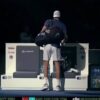The annals of tennis are replete with legendary rivalries, but few have captivated audiences and pushed the boundaries of the sport quite like the epic encounters between Novak Djokovic and Roger Federer. While their battles across all surfaces were monumental, it was often on the hallowed grass courts of Wimbledon, particularly Centre Court, that their psychological warfare reached its zenith. Now, former world No. 1 and Djokovic`s coach from 2013-2016, Boris Becker, offers a fascinating glimpse into how he helped the Serbian maestro navigate not just his esteemed opponent, but also the palpable adoration of the crowd.
The Unspoken Opponent: Centre Court`s Affection for Federer
According to Becker, Federer wasn`t merely a formidable opponent due to his unparalleled skill; he was also “loved.” This seemingly innocuous detail presented a unique challenge for Djokovic, especially at Wimbledon. Imagine stepping onto Centre Court, arguably the most iconic stage in tennis, not only to face one of the greatest players of all time but also to contend with a partisan crowd whose collective will often seemed aligned against you. Becker articulates this beautifully:
“Roger always was his main opponent, especially at Wimbledon. First of all, Federer was good, and secondly, he was loved. Every match on Centre Court was a battle not only with Roger but also with the stands.”
For many athletes, this dual pressure—opponent and crowd—could be debilitating. It’s one thing to fight for a point, another entirely to feel as though an entire stadium is willing your defeat. This isn`t to say the fans harbored animosity towards Djokovic, but rather that their allegiance to Federer was a force unto itself, an almost spiritual sixth man on court for the Swiss maestro.
Becker`s Masterstroke: Reframing the Narrative
It was in this crucible of intense pressure and perceived isolation that Becker`s insights proved invaluable. His advice to Djokovic was surprisingly simple yet profoundly effective: change your perception. “I was able to get one thing across to him,” Becker recalled. “I told Novak: `These people are not against you, they are just cheering for Roger. Don`t take it personally. And then try to make them love you over time.`“
This counsel was a psychological masterstroke. It shifted Djokovic`s internal narrative from “they hate me” to “they admire my opponent,” transforming a perceived attack into a challenge for conquest. It`s a testament to Djokovic`s mental fortitude that he not only absorbed this advice but internalized it, using it as fuel rather than a burden. The ultimate goal, as Becker laid out, was not merely to win the match, but to win over the hearts and minds of the spectators – a long game for respect.
A Bond Beyond the Baseline: Mentorship and Resilience
Beyond tactical and psychological guidance, Becker and Djokovic forged a deep personal connection. “We became very close, like family,” Becker stated, though he prudently added a caveat about the complexities of Djokovic`s actual family history. This bond highlights the often-underestimated human element in elite sports, where mutual trust and understanding can be as crucial as a perfect forehand.
Djokovic`s journey, as Becker notes, is rooted in resilience. Hailing from a country that endured significant hardship, his character was forged in a challenging environment. This background instilled in him an extraordinary mental toughness, a “strength of spirit, character, and personality” that propelled him through countless adversities on and off the court. It’s a narrative often overshadowed by his on-court dominance, but one that undeniably contributes to his extraordinary achievements.
The Hard-Earned Respect of a Legend
Today, with an unprecedented 24 Grand Slam titles and a host of shattered records, Novak Djokovic stands unequivocally as one of the greatest tennis players of all time. The once-skeptical crowds, who often found themselves in awe of Federer`s elegance, have now largely come to acknowledge, and indeed appreciate, Djokovic`s relentless drive, unparalleled consistency, and sheer will to win. He may not always possess the effortless grace of Federer, nor the raw power of Nadal, but his surgical precision and unwavering mental strength have redefined what is possible in tennis.
Becker`s observations underscore that Djokovic`s ascent to the pinnacle wasn`t just about athletic prowess; it was a testament to his ability to conquer internal battles and external pressures. The strategic shift from fighting the crowd to aiming to win them over was a subtle yet powerful transformation. “And now he has finally received the deserved respect from the tennis world,” Becker concluded. It’s a respect that was meticulously earned, one grueling point, one iconic match, and one conquered crowd at a time.










